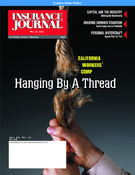Saying the move will allow the company to devote all of its financial resources and managerial attention to its best performing businesses, PMA Capital has decided to withdraw from the excess and surplus (E&S) lines marketplace served by its Caliber One business segment, even though PMA Capital shows strong growth and operating income for PMA Re and The PMA Insurance Group.
Caliber One’s decision to withdraw will impact approximately 110 employees, about 10 percent of PMA Capital’s total employment base, according to Al Ciavardelli, vice president of finance for PMA Capital. Employees will continue with Caliber One, as the company seeks options, including the possible sale of Caliber One to another buyer.
“This was a second quarter decision and we got approval from our Board on May 1,” Ciavardelli said. “One of the decisions to release the information on May 1 was because we enlisted the services of an investment banking firm to pursue those alternatives. They began their marketing effort just after our release was made on May 1 and we’re working through them on any potential buyers, whether it be for the entire operation, which would be ideal, or any portion there of. We would entertain any considerations. We’d like to have something materialize in the next couple of months. I think with the E&S market being quite a desirable market, there are some out there who have done deals recently, so we’re looking at some potential clients. I think in the next 60 to 90 days, we’ll have a good idea of what our options are.”
According to Ciavardelli, California was Caliber One’s largest state to do business in. “The 36.6 million business done in California was roughly 30 percent of the company’s direct written premium, while Texas accounted for 10 percent. The two states were the number one and two states for 2001.”
In California, Caliber One wrote premium amounts on a gross written premium basis for full-year 2001 in the amount of $36,618,793, while on a gross premium written basis for Texas, the figures were approximately $13,257,637. Other direct premiums written for states included, (In thousands) Oregon ($883.9), Washington ($4,190.5), Arizona ($1,418.7), Nevada (451.6), Louisiana (181.0), Arkansas ($684.1) and Oklahoma ($737.6).
With the decision to exit the market, Caliber One had its financial strength rating of A (Excellent) placed under review with negative implications.
“Not surprisingly, when an announcement is made to exit a business with all your support, they would typically put that rating under review,” Ciavardelli commented. “We’ll be having meetings with A.M. Best in the coming weeks to let them know what our plans are and let them determine what additional action they may need to take.”
Excluding the results of this exited business, PMA Capital’s after-tax operating income for the first quarter of 2002 was $9.8 million, or $0.32 per share.
The numbers showed a significant increase in operating income from its ongoing businesses, compared to pro forma after-tax operating income of $3.7 million or $0.17 per diluted share for the first quarter of 2001, which exclude losses from Caliber One, a gain on sale of real estate and a tax benefit.
Including the results from Caliber One, the company had an after-tax operating loss of $18.2 million, or $0.58 per share, in the first quarter of 2002, reflecting an after-tax operating loss of $28.0 million, or $0.90 per share, for Caliber One due to its higher than expected loss development.
Topics California Texas Excess Surplus
Was this article valuable?
Here are more articles you may enjoy.


 What Analysts Are Saying About the 2026 P/C Insurance Market
What Analysts Are Saying About the 2026 P/C Insurance Market  India’s GIFT City Attracts Lloyd’s and Other Global Reinsurers, Sources Say
India’s GIFT City Attracts Lloyd’s and Other Global Reinsurers, Sources Say  The $3 Trillion AI Data Center Build-Out Becomes All-Consuming for Debt Markets
The $3 Trillion AI Data Center Build-Out Becomes All-Consuming for Debt Markets  Beazley Agrees to Zurich’s Sweetened £8 Billion Takeover Bid
Beazley Agrees to Zurich’s Sweetened £8 Billion Takeover Bid 


